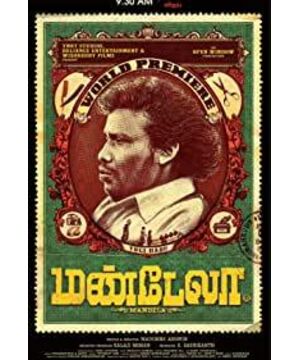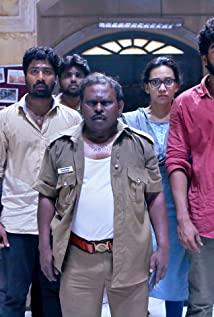The outbreak of the new crown epidemic has brought India to the forefront of international public opinion again. The behavior of government agencies to be swollen and fattened has brought long-standing social problems to the table.
Smart Indians are not without self-knowledge. They have been using artistic creation to observe and reflect on social issues. The movie "The Barber of Destiny" is the latest thinking result.
1
In a village called Qiulenguri in India, in order to prevent the villagers from going to the wild to solve the problem of excretion, the village chief just brought people to build a new public toilet.
I thought that after the grand opening ceremony, everyone would be able to embark on a civilized road that embraces cleanliness, health and hygiene, but the people in Nancun and Beicun actually quarreled over the right to use the toilet.
Some people think that the toilets built in Bei Village are not worthy of the people of Nan Village.
Others believe that when the village chief builds toilets for everyone, everyone should have the right to use them.
In fact, the two sides in the dispute are the two sons of the village chief. The North Village represents the eldest son Ratner, and the South Village represents the youngest son Ma Di.
As a father, the village chief of "Master Duan Shui" never provokes war on his own initiative. He always finds a third party to build the project. Even his two wives are from Nancun and Beicun respectively.
The wild dog in the village became the first user of the new toilet.
In the eyes of Indians, this is obviously a symbol of uncleanness, and the toilet must be cleaned before it can be used, and the villages of North and South are once again fighting over who will clean the toilet.
In the chaos, everyone thinks of one person—a barber who belongs neither to Nancun nor Beicun.
This person has no name or surname, because the mouth that cannot be closed is like a smile, so everyone calls him "smile", and he has nicknames such as idiots and fools.
Smile's greatest wish is to realize his father's ideal - to have a barber shop next to a big tree.
Although people often come to him to cut their hair and do not give money, he still earnestly saves money for his dream, and doesn't seem to care about everyone's ridicule.
In short, Smile is an "outcast" who is bullied by everyone, and has almost no sense of existence.
However, in the eyes of the villagers, he was just suitable for the job of cleaning public toilets with a low caste, and he agreed without complaint with a smile.
However, it was this little-known ordinary person who became the focus of the whole village in the next few months.
Because the money saved by Smile was stolen, he decided to go to the bank to save it, and he was given a new name, Nelson Mandela, who had no ID before.
At this time, Ratner of the North Village and Maddie of the South Village were vying for the position of the next village mayor. A protracted campaign tug-of-war.
2
The core of comedy is either tragedy or satire, and "The Barber of Destiny", which pushed "smile" to the altar, obviously belongs to the latter.
An unknown little person suddenly becomes the decider of the power struggle, which will inevitably lead to individual loss and group madness. The situation of Mandela and the voters of the North and the South also fits with these two developments.
For Mandela, he has always been used to everyone ignoring him, but now because of a vote, he has become a sweet pastry in the eyes of the village chief's son. It's like winning a lottery ticket.
In order to get this vote, the two sides of the campaign not only made Mandela eat and drink, but also built his dream barber shop within a few days.
The goal that originally required conscientious efforts to achieve was actually achieved easily because of a single vote. Mandela, who could not adapt to the changes, also naturally began to expand. He was illiterate and regarded "no one" on the ballot as the third candidate, and even Threatened - "If the third candidate doesn't give me money, then I won't vote."
In the hesitation of Mandela left and right, the restlessness of other villagers never stopped, because the whole village was paying attention to the whereabouts of this vote, and quarrels and anger broke out from time to time.
Because, behind the election farce, there are huge economic benefits - the councilor hopes that the village chief will agree to build a factory in Qiulanguri, and the next village chief will receive 50 million in benefits.
It is precisely for this huge sum of money that the two groups of talents took over the crowd through various methods such as issuing vouchers, making publicity peripherals, and forcibly detaining voters.
Mandela was still struggling with who to vote for, but his friend quietly told him that Ratner and Maddie, who seemed to be incompatible, had already reached a tacit agreement, and the party who did not win the vote would take off Mandela's arm. .
Seeing that his life was in danger, Mandela tried to escape, but was only beaten.
Thoroughly sober, Mandela began to make more "excessive" demands on the condition of voting: build public toilets, pave roads, repair schools...
When the two candidates unknowingly did a lot for the villagers, they realized what Mandela's little Jiujiu was planning.
The threat of death has come again, and the villagers who have benefited a lot have stood up one by one. A popular struggle, in the most gentle way, pushed the story to a climax.
3
Just like the translation of "The Barber of Destiny", Mandela got the script of "The Chosen Son". The conflicting setting of a vote to decide the outcome clarifies the style of absurd comedy and turns the whole story into a A profound social fable.
The film takes the changes in Mandela's encounters as clues, and what really accuses is India's social problems.
The first is the caste system that divides people into three, six, and nine classes.
This system divides people into 4 classes and inherits them from generation to generation, namely Brahmins, Kshatriyas, Vaishyas, Sudras, and Dalits of the fifth caste known as "untouchables".
Because Mandela belonged to a low caste, he was called to clean the public toilets, and the old village head, a self-confessed master of Duan Shui, acquiesced in ignoring and bullying Mandela, which further reflected the class concept and social prejudice behind the Indian caste system. ingrained.
The second is pervasive poverty for a long time.
The reason why Mandela's barber shop can't make money is because most of the villagers are also very poor and can't afford it at all. The little girl who came to cut her hair even said that the lice on her body were the cost of the haircut.
Although this is a designed joke, it just describes the real state of poor people who have nothing in real life.
And then there's sexism, health issues, political corruption, etc., which have received worldwide attention...
When the women toileting in the grass begged Mandela to help drive away the peeking man, The Barber of Destiny's fast-turning plot became a proletarian awakening.
It watched the social farce in a light-hearted and playful way, and also allowed the villagers represented by Mandela to start a new round of seemingly fragile but significant conceptual revolution.
Although the laughter is dense and the rhythm is lively, "The Barber of Destiny" is still lengthy and some plots are protracted, such as: the repeated depiction of Mandela's character, the continuous fighting between the two groups, etc., will inevitably cause the audience to repeat, Tired look.
However, finding his own Mandela in the lost and confused also shows the deep thinking of the creator: the "vote" sent by the hand of fate is only an opportunity to make a choice, and those who have the courage to change are the real life 's owner.
And this is the fire of hope that all vulnerable groups and poor areas need most. Samsung and a half
View more about Mandela reviews









